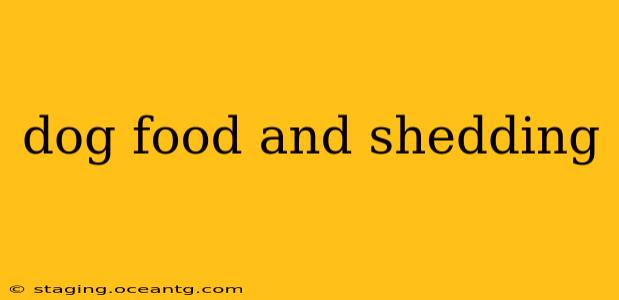Shedding is a natural process for dogs, but the amount of shedding can be influenced by many factors, including diet. While no food can completely stop shedding, the right dog food can significantly impact its severity and the overall health of your dog's coat. This comprehensive guide explores the connection between dog food and shedding, answering common questions and providing valuable insights for dog owners.
What kind of dog food is best for reducing shedding?
The best dog food for reducing shedding is one that is high-quality, containing a balanced blend of nutrients essential for healthy skin and coat. This typically means foods rich in:
-
Omega-3 and Omega-6 fatty acids: These are crucial for maintaining a healthy skin barrier and reducing inflammation, which can contribute to excessive shedding. Look for foods that specifically list these fatty acids, often derived from fish oil (Omega-3) and vegetable oils (Omega-6). The ideal ratio of Omega-6 to Omega-3 is often debated, but a balanced proportion is key.
-
Protein: High-quality protein is essential for building and repairing skin and hair cells. Choose foods with named protein sources like chicken, lamb, or salmon, rather than just "meat by-products." The protein source should be listed as the primary ingredient.
-
Biotin: This B vitamin plays a vital role in keratin production, a key component of hair and nails. While many commercial dog foods contain sufficient biotin, you might consider a supplement if shedding remains excessive after dietary changes. Always consult your veterinarian before adding supplements.
-
Zinc: Zinc is another crucial mineral for healthy skin and coat. It contributes to cell growth and repair.
Avoid foods with fillers, artificial colors, and preservatives, as these can irritate the skin and worsen shedding. Reading the ingredient list carefully is crucial. Look for foods with whole, recognizable ingredients.
Does changing dog food reduce shedding?
Yes, changing dog food can reduce shedding, but it's not a guaranteed solution. The results depend on several factors, including the underlying cause of the shedding. If the shedding is due to dietary deficiencies, switching to a high-quality food formulated for skin and coat health can often make a noticeable difference within a few weeks to a couple of months. However, if the shedding is caused by allergies, parasites, or underlying health conditions, dietary changes alone might not be sufficient.
How long does it take for dog food to affect shedding?
You may not see immediate results. It generally takes several weeks, sometimes even two to three months, to observe a significant reduction in shedding after switching to a new food. This is because it takes time for the new nutrients to influence skin and coat health at a cellular level. Patience is key.
Can I give my dog supplements to reduce shedding?
While some supplements, like fish oil, biotin, and zinc, can support healthy skin and coat, always consult your veterinarian before introducing any supplements to your dog's diet. They can assess your dog's specific needs and determine if supplements are necessary and appropriate, considering potential interactions with existing medications. Improper supplementation can be harmful.
What are the common causes of excessive shedding in dogs?
Excessive shedding isn't always just about diet. Several factors can contribute:
- Seasonal changes: Dogs shed more during spring and autumn to adapt to temperature fluctuations.
- Allergies: Food allergies, environmental allergies (pollen, dust mites), or flea allergies can trigger excessive itching and shedding.
- Parasites: Fleas, ticks, and mites can irritate the skin, leading to increased shedding.
- Underlying health conditions: Hormonal imbalances, thyroid problems, and certain skin conditions can also cause excessive shedding.
- Breed: Certain breeds are naturally heavier shedders than others.
- Stress: Stress can also exacerbate shedding.
If you've made dietary changes and are still seeing excessive shedding, consult your veterinarian to rule out other underlying causes.
This information is for general knowledge and should not be considered a substitute for professional veterinary advice. Always consult your veterinarian for any concerns about your dog's health and diet.
